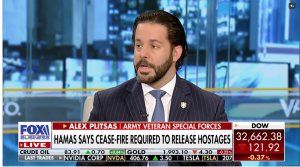The complex wars playing out from Eastern Europe to the Arabian Peninsula have cast a spotlight on how partnerships between major military powers and local groups can be a powerful force multiplier for Special Operations Forces (SOF).
With global alliances rapidly shifting, the implications for America’s security are profound. For generations, our partnerships with foreign forces around the world have played a critical role in U.S. foreign policy and overall military strategy. More often than not, our SOF are a key factor in preserving and strengthening our relationships with trusted partners.
What’s true for the U.S. is true for other nations as well. Russia’s growing support for the Houthis in Yemen, the UAE’s reported ties to Sudan’s Rapid Support Forces (RSF), and Israel’s arming of anti-Hamas clans in Gaza all cast a spotlight on what’s at stake when it comes to global partnerships in the world’s toughest neighborhoods.
The Trust Deficit
For many decades, SOF have paved the way in forging strategic partnerships, as Lt. Gen. Michael Nagata (Ret.) has argued in Military Times. Nagata, who led special operations for U.S. Central Command (CENTCOM) during pivotal moments in the Middle East, described the hidden power of working with foreign partners:
“Its dimensions cannot be measured by a micrometer, or its existence weighed on any scale. Indeed, its strength lies in the fact that it is deeply emotional, psychological, and highly personal.”
Unfortunately, America’s track record of keeping its promises to strategic partners is underwhelming.
In Iraq alone, over the course of five presidencies we abandoned each of Iraq’s three major ethno-religious groups (the Sunnis, Shiites, and Kurds) at least once each. In 1991, we abandoned the Shiites and Kurds to Saddam Hussein’s savagery after promising to support their rebellion against his rule. In 2007, we allowed Turkey, a U.S. ally, to bomb another of our allies, the Iraqi Kurds.
Then when the Islamic State group (ISIL) rose up in the wake of America’s withdrawal, we stood by as the terrorist group overran the same Sunni tribal partners who had been pivotal in defeating al-Qaeda in Iraq. Then we betrayed them again by working alongside Shiite Popular Mobilization Forces (PMF) to counter ISIL, despite their sectarian killings of Iraqi Sunnis and their known loyalty to Iran.
After such fair-weather commitments, it’s fair to ask why an Iraqi would ever trust another American promise.
Abandoning Afghan Allies
The U.S. withdrawal from Afghanistan crystallized decades of partnership mismanagement, culminating in abandoning our allies to our once-shared enemy: the Taliban.
U.S. forces invested 19 years developing relationships with Afghan nationals who fought and bled alongside us. For their service to America, we promised them a secure future, including a life in the country they had fought for by way of Special Immigrant Visas (SIV).
Yet when the withdrawal date from Afghanistan was announced, it was clear that our sluggish bureaucracy couldn’t accommodate either the volume of our commitments to our partners or the backlog of applications. Afghan allies and their families who weren’t already in the visa pipeline had little hope. Many were later killed by the Taliban.
Measuring Costs, Identifying Solutions
The impact of these failures cannot be overstated. The moral injury to U.S. troops who watched nearly two decades of partnership forged in blood collapse over a long weekend will have ripple effects for decades.
Yet the costs to morale and military effectiveness pale in comparison to the strategic damage to American credibility overseas. After such a track record, who do we realistically expect will want to partner with U.S. forces or take the guarantees of American diplomats at face value?
These systematic failures stemmed from the absence of a coherent strategic framework guiding our partnerships overseas. While the blame is shared by multiple presidential administrations, the solution is straightforward: A new National Security Strategy (NSS) that incorporates all aspects of American power, including military, diplomatic, intelligence and financial.
Since the collapse of the Soviet Union, American foreign policy has operated tactically instead of strategically, reacting to emerging threats with Cold War thinking and outdated institutions. Our instruments of national power became siloed and far removed from our core national interests.
Without unified political direction, these institutions have become bureaucratic factions more interested in protecting their budgets and authorities than in mission effectiveness. The price has been enormous: The 9/11 Commission Report identified this kind of institutional fragmentation as contributing to intelligence failures that enabled the September 11 attacks.
Strategic Requirements for Partnership Success
After the 9/11 intelligence failure, America responded by improving information-sharing and emphasizing a whole-of-society approach to counterterrorism that involved everyone from the CIA and local police to Wall Street. What we didn’t do was unify these lines of effort into one comprehensive strategy that clarified who we were fighting and why.
Without an adequate, up-to-date NSS, our leaders lacked a common anchor and a reference point that voters could understand. As a result, each president since the start of the Global War on Terror (GWOT) has had his own interpretation of what it means to fight terror.
This strategic incoherence produces chaotic partnership management: rapid shifts between Iraqi factions, overnight abandonment of Afghan commitments, and inconsistent support for Ukraine and Israel. Key allies now question whether American partnership is reliable enough to offer strategic value.
President Trump’s reported plan to unveil a new NSS offers an important opportunity to fix what is broken. A comprehensive, updated NSS would situate our partnerships within the broader context of American interests, creating a solid basis to build relationships that serve our national security.
As Nagata correctly argues, the success of foreign partnerships lies largely in the strength of deep personal bonds. On the other hand, we must not forget Lord Palmerston’s maxim from nearly two centuries ago: A nation’s interests are enduring, but allies and enemies come and go. An updated NSS may not have prevented the rapidly changing allegiances of the GWOT, but it would have better limited such shifts to what was truly necessary to protect U.S. interests.
Our national interests must dictate our relationships, not the other way around. By clearly articulating America’s interests to domestic and international audiences, we can avoid making unrealistic commitments that then force us to choose between losing credibility or overextending ourselves. In the wake of the GWOT, America has managed to do both.
Protecting American security and empowering our SOF requires that we not only maintain existing partnerships but cultivate new ones. To succeed in that mission, we must frame those relationships in the context of our core national interests, codified in a National Security Strategy fit for the 21st century.
Photo Credit U.S. Army National Guard photo by 1st Sgt. James Tomlinson





